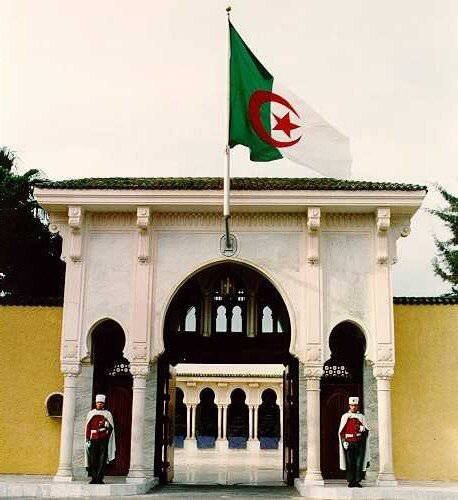Le systéme institutionnel Algérien
L'Algérie est une république régie par la Constitution de 1996. Bien que le régime soit démocratique les militaires exercent encore aujourd'hui un grand pouvoir sur la vie politique algérienne. .
Depuis les années 1990 et en particulier depuis la chute du mur de Berlin, l'Algérie est sortie d'une économie de type planifié (Socialisme d'État) pour se diriger vers une économie de marché, avec l'appui des puissances européennes et occidentales.
L'Algérie est un État où le multipartisme est autorisé, près de soixante partis politiques existent ou ont existé depuis la libéralisation du pays en 1988. Tous les partis doivent être approuvés par le Ministère de l'Intérieur après enquête. La constitution précise :
« Dans le respect des dispositions de la présente Constitution, les partis politiques ne peuvent être fondés sur une base religieuse, linguistique, raciale, de sexe, corporatiste ou régionale. […]
Toute obédience des partis politiques, sous quelque forme que ce soit, à des intérêts ou parties étrangers, est proscrite.
Aucun parti politique ne peut recourir à la violence ou à la contrainte, quelles que soient la nature ou les formes de celles-ci. »

Le pouvoir exécutif
Le Président de la République
Le chef de l'État est le Président de la République, qui est élu au suffrage universel, direct et secret pour un mandat de cinq ans. Jusqu'à la réforme constitutionnelle de 2008, le Président de la République n'était rééligible qu'une seule fois, la réforme à supprimé toute limitation du nombre de mandats. Le président est le chef du Conseil des ministres, et du Haut Conseil de sécurité.
Il est également le chef des armées, il est responsable de la défense nationale, il arrête et conduit la politique extérieure de la Nation, il préside le Conseil des ministres, il nomme le Premier Ministre et peut également mettre fin à ses fonctions, il signe les décrets présidentiels, il dispose du droit de grâce, du droit de remise ou de commutation de peine. Il peut également organiser des référendums, décerner des décorations et conclure et ratifier des traités internationaux.
Le président nomme :
le Président du Conseil d’État ;
le Secrétaire Général du Gouvernement ;
le Gouverneur de la Banque d’Algérie ;
les magistrats ;
les responsables des organes de sécurité ;
les Walis.
Le Premier ministre
Le Président de la République nomme le Premier Ministre qui est le chef du gouvernement. Le premier ministre doit soumettre son programme à l’approbation de l’Assemblée populaire nationale. Celle-ci ouvre un débat, et le chef du gouvernement peut adapter son programme aux envies des parlementaires. Dans un deuxième temps, le premier ministre doit émettre une communication de son programme au Conseil de la nation.

Si l'Assemblée Populaire Nationale rejette le programme du gouvernement, le premier ministre doit remettre la démission de son gouvernement au Président de la République. Il nommera un nouveau premier ministre selon les mêmes modalités citées plus haut.
Mais si l'Assemblée Populaire rejette de nouveau le programme du chef du gouvernement, l'assemblée est dissoute et de nouvelles élections législatives ont lieu.
Le gouvernement en place est maintenu pour expédier les affaires courantes, jusqu’à l’élection d’une nouvelle assemblée qui doit intervenir dans un délai maximal de trois mois.
Le Chef du Gouvernement peut demander aux parlementaires un vote de confiance, si la motion de confiance n'est pas votée, le gouvernement doit présenter sa démission au président.
Le Chef du Gouvernement a plusieurs attributions :
il répartit les attributions entre les membres du Gouvernement, dans le respect des dispositions constitutionnelles ;
il préside le Conseil du Gouvernement ;
il veille à l’exécution des lois et règlements ;
il signe les décrets exécutifs ;
il veille au bon fonctionnement de l’administration publique.
Pouvoir législatif
Le parlement algérien est bicaméral, il se compose d'une chambre basse, l'Assemblée populaire nationale qui est constitué de 389 députés. Et du Conseil de la nation qui compte 144 parlementaires.
Les élections législatives ont lieu tous les cinq ans, les dernières élections législatives ont eu lieu en 2012. Les deux tiers du Conseil de la Nation sont élus par des autorités régionales et municipales, le dernier tiers est nommé par le Président de la République. Ils sont mandatés pour un mandat de six ans, la Composition du Conseil de la Nation est renouvelable par moitié tous les trois ans.
Le parlement contrôle l'action du gouvernement. Le mandat de député et de membre du Conseil de la Nation est non cumulable avec d'autres mandats ou fonctions. L’initiative des lois appartient concurremment au Chef du Gouvernement et aux députés, les propositions de lois pour être recevables doivent être déposées par au moins vingt députés.



/image%2F1307487%2F20240414%2Fob_5f1137_messenger-creation-0be6fdfe-aff8-4b46.jpeg)
/image%2F1307487%2F20240317%2Fob_4d78a4_20240316-163013.jpg)
/image%2F1307487%2F20240303%2Fob_230fb0_20240302-153118.jpg)
/https%3A%2F%2Fstorage.canalblog.com%2F25%2F72%2F1172757%2F134180966_o.jpg)



